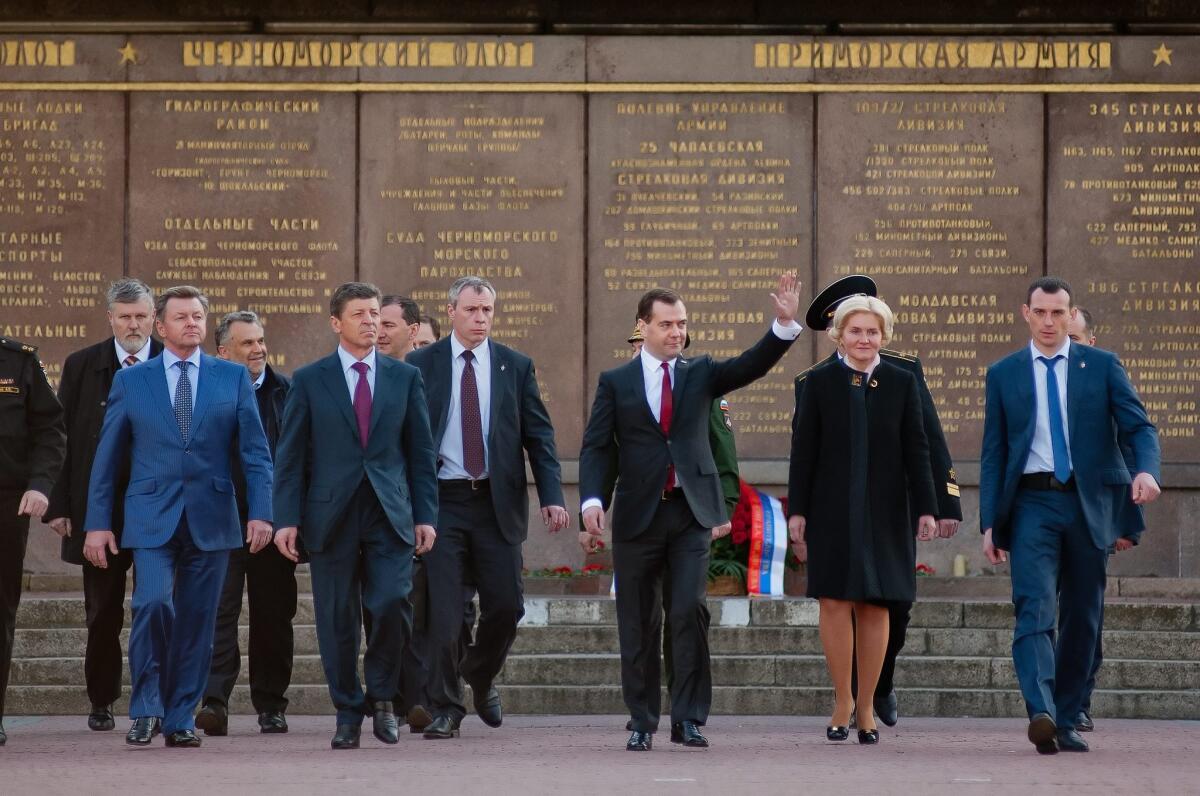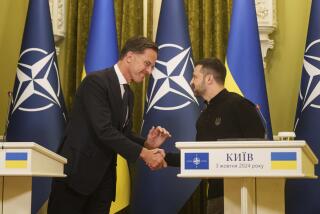Russian prime minister visits annexed Crimea, promises investment

Russian Prime Minister Dmitry Medvedev waves as he leads a delegation of Russian government officials on a visit to Crimea, visiting the World War II Memorial to the Heroic Defense of Sevastopol.
Russian Prime Minister Dmitry Medvedev on Monday paid the highest-level Kremlin visit to Crimea since the territory was seized from Ukraine last month, and promised lavish investment and aid for the newly annexed region’s 2 million residents.
Medvedev led a Russian government delegation to Crimea’s capital, Simferopol, and convened a Cabinet meeting at which the Russian officials proclaimed the region a special economic zone entitled to tax breaks and other incentives for investors.
“People in Crimea mustn’t lose anything after joining Russia, they must only make gains,” Medvedev said at the gathering that was televised in Russia. “People expect us to create conditions for calm and respectable life, confidence in tomorrow, the feeling of being part of a strong country. We must meet these expectations.”
Medvedev also promised that the Russian government would invest in creating energy independence for the peninsula that has relied for decades on the Ukrainian mainland for 80% of its electricity and water needs.
“It is vitally important to ensure reliable and independent electricity supplies to the whole of Crimea and supply fuel to the power industry,” Medvedev was quoted as saying by the Itar-Tass news agency.
The Russian government leader said Crimea could be integrated into the Russian energy grid across the Kerch Strait -- the narrow waterway between the peninsula’s eastern extreme and Russia’s Caucasus region -- if that proves a more practical option than building new power-generation facilities in the geographically challenging region, which includes mountains and swamps.
Medvedev’s visit to Crimea was “a crude violation” of international diplomacy as he arrived without prior notice to Kiev, said Ukrainian Foreign Ministry spokesman Yevhen Perebynis.
Russian forces invaded Crimea in late February, after a three-month rebellion drove Ukrainian President Viktor Yanukovich to abandon Kiev and flee to Russia. Moscow doesn’t recognize the transitional government installed after its ally abdicated. Russian President Vladimir Putin has justified the seizure and annexation of Crimea with claims that the Russian population there was at risk after an “unconstitutional” leadership change.
The United States, the European Union and the U.N. General Assembly have condemned Russia’s land grab as a violation of international law. But intense diplomatic efforts to press Russia to reverse course have failed, and the Kremlin has steadily tightened its grip on Crimea with moves such as Medvedev’s visit promising benefits from the Russian takeover.
Russian investment will aim to make Crimea a top tourist destination for Russians, Medvedev said. The peninsula’s southern Black Sea coast has been a favorite summer retreat for Russians since czarist times but failed to flourish in the post-Soviet era, in part due to the rampant corruption afflicting both the Russian and Ukrainian economies.
“We must create a new investment history for Crimea, which will be more successful than what it has been,” Medvedev said, according to the Russia Today news outlet. “We have to ensure swinders don’t take advantage of this state in transition.”
Medvedev also announced that “sufficient volumes” of Russian rubles had been delivered to Crimea to allow the currency to circulate alongside the Ukrainian hryvnia during a transition period to run until 2016.
Meanwhile, in Moscow, the lower house of the Russian parliament voted unanimously to abrogate treaties with Ukraine that governed Russia’s use of the peninsula as the port of its Black Sea fleet. The agreements brokered with Kiev after the breakup of the Soviet Union granted the Russian military control of the Sevastopol naval base and had been extended four years ago to guarantee Moscow’s lease until 2042.
The action by the State Duma followed a Kremlin declaration this month that the treaties were unnecessary now that Crimea is part of Russia, the Moscow Times reported.
Twitter: @cjwilliamslat
More to Read
Sign up for Essential California
The most important California stories and recommendations in your inbox every morning.
You may occasionally receive promotional content from the Los Angeles Times.











